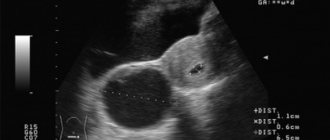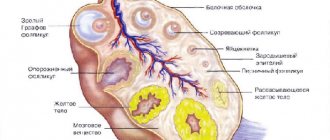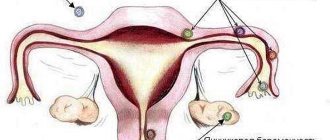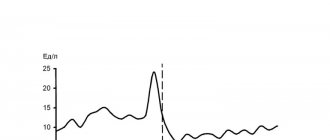Many women in the 1st and 2nd trimester of pregnancy noted a tingling sensation in the ovary - painful sensations of an aching nature, and sometimes sharp, severe stabbing pains. But is tingling in the ovary a sign of pregnancy, or is it a symptom of some dangerous disorder occurring in the body that requires immediate medical attention? To answer this question, we need to understand what causes can lead to pain in the pelvic organs.
The main causes of tingling in the ovaries:
- Sprain - along with the growth of the fetus, changes occur in the uterus, which increases in volume and rises higher, and after it the neighboring organs rise. That is, when a “knowledgeable” woman shares her experience and says that if the right (left) ovary colitis is a sign of pregnancy, in fact we are talking about pain in the place where this organ is usually located. It's not there, but there are tense, stretchy ligaments that support the uterus;
- Adnexitis (inflammation of the ovaries) or oophoritis (inflammation of the appendages), against the background of which conception occurred. This condition of the female body requires constant monitoring by a gynecologist, as it can cause miscarriage or fetal death.
- Radiating pain from the intestines down the abdomen. After conception, a woman needs to carefully monitor her diet and try to eat foods so that her stools are soft and regular. If this cannot be achieved or the pain is prolonged, then consultation with a specialist is required.
- Benign/malignant neoplasms (cysts/tumors) of the ovaries can cause not only a slight tingling sensation, but also severe pain. Women with this diagnosis are usually under the constant supervision of doctors in the gynecological department of the hospital for almost the entire period of pregnancy.
- Ectopic pregnancy . If you have severe pain in the lower abdomen after conception, and you haven’t gone to an ultrasound or to a gynecologist yet, then it’s time to do it, at least in order to weed out an ectopic pregnancy, and not put yourself in a stressful state.
Why do my ovaries hurt, left or right?
Typically, pain in the ovarian area is cramping and stabbing in nature. However, based on these signs, it is impossible to accurately determine that it is the ovaries that are hurting. After all, inflammation of appendicitis, kidney disease and digestive system have the same expression. Therefore, you should not diagnose yourself; you can see a gynecologist at our medical center in Moscow.
In some cases, the pain may be periodic. In this case, the pain manifests itself either in the lower abdomen, then in the kidney area or in the pubic area. At times you may experience leg cramps. Pain in the left ovary is rare and mainly indicates a harmful external influence. If there is pain in the left ovary, most likely it is due to the medications you are taking.
Pain in this area indicates problems with the reproductive system or hormonal phenomena. Both types of illness can lead to complications, so you should not delay the examination. Only an experienced doctor will be able to accurately determine the disease and say exactly why the ovaries hurt.
Treatment of ovarian apoplexy at Life Medic
Ovarian apoplexy is one of the most serious problems. In this case, hemorrhage occurs in the ovary, which poses a threat to the normal functioning of this organ. To understand how this happens, it is necessary to consider the menstrual process in a woman’s body:
1. When an egg matures in a follicle, it must receive sperm.
2. This does not happen and due to the death of the egg, menstruation occurs.
3. The blood of the dead egg filling the follicles is removed from the body.
So at this time, these organs are especially tense, as they are filled with blood, and the risk of damage to blood vessels also increases. When the walls of the ovary cannot withstand it, the blood entering it from the artery spills inside.
Causes of ovarian apoplexy
In general, the right pair is more often susceptible to apoplexy, since it is larger and more blood circulates in it than in the left. Therefore, the right ovary hurts more often. Blood enters the right organ directly from the aorta, and the left one through the blood vessels of the kidney. This also causes increased pressure and tension in the right organ. So, if for some reason the right ovary hurts, then the reason is most likely apoplexy.
Ovarian apoplexy most often occurs in teenage girls and young women. In many ways, it is this group that is at risk, since the reproductive organs most actively perform their function in them. In very rare cases, apoplexy can result from mechanical damage. Other causes of apoplexy
In addition to natural processes, hemorrhage can be caused by:
- overly active sex
- improperly performed gynecological procedure
- excessive stress on muscles
These are all mechanical factors. However, there are also pathogenic factors:
- pathology of the uterus;
- tumors;
- varicose veins;
- improper healing after surgery or injury;
- ovarian inflammation
So pain is a symptom not only of disorders in these organs themselves.
Symptoms of ovarian apoplexy
The main sign of apoplexy in a woman’s body is acute pain in the ovary or lower abdomen, which aches. And usually the right ovary hurts. However, the disease may be accompanied by other signs:
- vomit;
- dry mouth;
- tachycardia;
- stickiness of sweat;
- hypotension;
- pale skin color;
- temperature increase.
Usually, additional symptoms indicate that the accumulation of blood has reached its critical level and an attack of pain may soon occur. When the right or left ovary is pulled, it is necessary to urgently consult a doctor, otherwise complications are possible.
Or maybe you're pregnant? The first signs of pregnancy before the delay and in the first days after it
+Very often, after two lines appear on the test, a woman says to herself: “Wait! But I felt for a long time that I was pregnant!” and for many, a positive test is not a surprise, but rather a confirmation of what intuition already suggested. What are the first changes in the body that give our subconscious a reason to suspect pregnancy when we ourselves are still driving away all sorts of assumptions, saying to ourselves: “Well, there’s no point in fantasizing. We need to at least wait for a delay!” The article collects and analyzes not only the classic signs of pregnancy, but also the signs of pregnancy described by participants in one of the pregnancy planning sites BEFORE THEY KNEW ABOUT PREGNANCY and during the week after.
The discharge can range from light bleeding to just a few brown droplets or even just a “yellowish mark” on the toilet paper. Usually the thought that accompanies them is: “Somehow my period is early this time,” or “well, my period is here.”
This implantation bleeding is one of the earliest signs of pregnancy. Approximately 6 to 12 days after conception, the embryo is planted on the uterine wall. For some women, this process is accompanied by bleeding, but for many, no discharge appears at all, which is also normal.
Treatment of polycystic ovary syndrome at Leib Medic
Polycystic ovary syndrome is one of the main diseases leading to infertility. Cystosis develops very slowly and it is rarely possible to detect it in the initial stages. It is usually diagnosed accidentally, during the next examination. Tingling in the left or right ovary can be a symptom of a similar disease. However, polycystic disease can be expressed by tingling in the right ovary. The disease occurs due to improper formation of the egg. Sometimes due to pathologies of the ovary itself. In both cases, it is difficult for the egg to leave the organ and over time the channels begin to accumulate tissue of residual eggs and polycystic disease develops. Also, a large number of underdeveloped eggs accumulate in the organ itself. Polycystic ovary syndrome mainly occurs in women under 35 years of age. It is especially dangerous for teenagers who are just beginning to menstruate. The presence of cystosis, in addition to periodic pain, causes disruption of the menstrual cycle. So polycystic disease has a direct effect on hormonal functions. This can disrupt hormonal processes, which usually leads to cardiovascular diseases, diabetes, etc.
Causes of polycystic ovary syndrome
The exact reasons for the occurrence of polycystic ovary syndrome have not yet been identified. All patients had the following pathologies, which presumably lead to the development of this disease:
- endocrine system imbalance;
- insulin oversaturation;
- chronic inflammation;
- obesity;
- heredity.
Any of these pathologies can lead to the formation of ovarian cysts.
Symptoms of polycystic ovary syndrome
Doctors identify the following symptoms of cystic disease:
- abnormal menstruation;
- hypertrachia (excessive hairiness);
- skin problems;
- pulling sensation in the ovary area;
- excessive weight.
All these signs are associated with pain that occurs in the lower abdomen.
Why does the ovary hurt or tingle?
At the moment of ovulation, a small wound forms on the wall of the ovary, the appearance of which is caused by the release of the cell and the rupture of the vesicle. She makes herself known, what many women feel. This is expressed by the manifestation of a slight nagging pain in the lower abdomen, in which case they say “the ovary tingles after ovulation.” Such pain is usually mild and short-lived; some may not even feel it.
A mature egg leaves the ovary, which may cause tingling
By the tingling sensation, you can determine in which of the ovaries the process is occurring. It is necessary to calculate the day of the expected release of the egg according to your menstrual cycle and begin to listen to the signs of the body. If the left ovary tingles during or after ovulation, it means that at this stage the action of cell formation took place in it. And when it hurts or pulls on the right side, it means work was done here.
Tingling in one of the ovaries - what could be the reasons?
If the tingling of the ovary turns into severe pain or bothers you for more than two days, there may be other reasons:
- the presence of any inflammatory diseases;
- disruption of hormonal levels in the body;
- incorrect location of the uterus with appendages;
- pathology of development of female genital organs;
- irregular menstrual cycle, etc.
So, if the ovary tingles during or immediately after ovulation, you should pay attention to this to identify a favorable period of conception. But it should be remembered that pain perception in this case is short-term and should disappear upon the onset of the second stage of the cycle. Otherwise, do not forget to visit your doctor. You should always take care of your health.
Ovulation has already passed a long time ago, your period is coming soon, and today for some reason your ovary is tingling? Has anyone had this happen and what could it be?
Woman.ru experts
Find out the opinion of an expert on your topic
Neshchadim Dmitry Vladimirovich
Psychologist, Medical clinical psychologist. Specialist from the site b17.ru
Muratova Anna Eduardovna
Psychologist, Online consultant. Specialist from the site b17.ru
Tankova Oksana Vladimirovna
Psychologist, Online consultant. Specialist from the site b17.ru
Natalya Evgenievna Pokhodilova
Psychologist, Kinesiologist Online consultant. Specialist from the site b17.ru
Elena Barkhatova
Psychologist, Consultant. Specialist from the site b17.ru
Irina Viktorovna Baranova
Psychologist. Specialist from the site b17.ru
Sakharchuk Svetlana Alexandrovna
Psychologist, Psychologist - consultant. Specialist from the site b17.ru
Yulia Bugrova
Psychologist, Existential approach. Specialist from the site b17.ru
Nikulina Marina
Psychologist. Specialist from the site b17.ru
Vinogradova Galina Aleksandrovna
Psychologist, Gestalt therapist. Specialist from the site b17.ru
Are you sure that you were ovulating and not now? Unless you strictly check your basal temperature every day, you can’t always say with certainty. Ovulation could have been delayed. Although sometimes there are follicular cysts that go away on their own with the next cycle, this is nothing to worry about, a woman may not know about it unless she goes for an ultrasound, this happens to many (although if the cyst is large and causes obvious problems, pain, cycle disruptions, then she needs to be treated). This can also cause tingling.
SO THIS IS... A NEEDLE IN AN EGG.
Hedgehog, ovulation according to ultrasound was on the 13th day of the cycle, today is day 29. There could be a cyst. (
Crap. How do you feel these ovaries? I always have a tingling or shooting in my stomach, I always thought it was gas =))
Crap. How do you feel these ovaries? I always have a tingling or shooting in my stomach, I always thought it was gas =))
Crap. How do you feel these ovaries? I always have a tingling or shooting in my stomach, I always thought it was gas =))
Related topics
where does it sting? above the pubis? or deep down closer to the buttocks?
where does it sting? above the pubis? or deep down closer to the buttocks?
It's no big deal, I get tingles and shoots all the time. First in the area of ovulation (but this is normal), and then again, closer to menstruation. Apparently they “work”, do something there, hormonal :) Don’t get hung up
It's no big deal, I get tingles and shoots all the time. First in the area of ovulation (but this is normal), and then again, closer to menstruation. Apparently they “work”, do something there, hormonal :) Don’t get hung up
because it is full of venous blood
This happens, sometimes before ovulation, sometimes hormonal fluctuations, sometimes a cyst. You need to do an ultrasound and not stress yourself out.
Ovulation has already passed a long time ago, your period is coming soon, and today for some reason your ovary is tingling? Who has had this happen and what could it be?
so maybe you are pregnant? ))
On July 27, my period began, on the same day in the evening I had an unprotected PA, the MP got into me, two weeks passed, the ovary began to tingle, sometimes there is a white discharge. Please tell me, could this be pregnancy?!
Now I’m sitting like a needle in my right ovary, I wish I was pregnant)))
The beginning of the last menstruation was 26.08 (usually every 25 days, this time 23 days of the cycle) Open sex with the goal of getting pregnant. The same thing happened 02.09 today 04.09 there is a tingling sensation in the right ovary. Could ovulation have occurred on this day or not? I would really like to believe that there is hope that fertilization has occurred.
The left ovary has been tingling for two days, no menstruation for 25 days, negative ultrasound test, went and was told to come back in a week, they don’t see anything
The left ovary has been tingling for two days, no menstruation for 25 days, negative ultrasound test, went and was told to come back in a week, they don’t see anything
I have had tingling pain in my ovaries for quite some time now. Definitely not pregnancy. I saw a gynecologist, they discovered a follicular cyst, prescribed a course of pills, but it didn’t help. No other abnormalities are observed: regular periods, no suspicious discharge. What could it be?
Hello, why does my left ovary tingle after conception?
I have had tingling pain in my ovaries for quite some time now. Definitely not pregnancy. I saw a gynecologist, they discovered a follicular cyst, prescribed a course of pills, but it didn’t help. No other abnormalities are observed: regular periods, no suspicious discharge. What could it be?
Forum: health
New for today
Popular today
The user of the Woman.ru website understands and accepts that he is fully responsible for all materials partially or fully published by him using the Woman.ru service. The user of the Woman.ru website guarantees that the placement of materials submitted by him does not violate the rights of third parties (including, but not limited to copyrights), and does not damage their honor and dignity. The user of the Woman.ru site, by sending materials, is thereby interested in their publication on the site and expresses his consent to their further use by the editors of the Woman.ru site.
Use and reprinting of printed materials from the woman.ru website is possible only with an active link to the resource. The use of photographic materials is permitted only with the written consent of the site administration.
Posting intellectual property objects (photos, videos, literary works, trademarks, etc.) on the woman.ru website is permitted only to persons who have all the necessary rights for such posting.
Copyright (c) 2016-2018 Hirst Shkulev Publishing LLC
Online publication “WOMAN.RU” (Zhenshchina.RU)
Certificate of registration of mass media EL No. FS77-65950, issued by the Federal Service for Supervision of Communications, Information Technologies and Mass Communications (Roskomnadzor) on June 10, 2016. 16+
Founder: Limited Liability Company "Hirst Shkulev Publishing"
Author: Rebenok.online · Published 02/03/2017 · Updated 03/22/2017
The process of egg maturation occurs in the body of every healthy woman every month. This period is called ovulation. The day the egg leaves the follicle is considered the most favorable day for conceiving a child. The ovulatory process can be accompanied by numerous pain symptoms with varying degrees of intensity.
Microbes in the ovaries
Of course, the presence and large accumulation of harmful microorganisms in the organs of the reproductive system leads to inflammatory processes and gives rise to pain in the ovary. When the number of such microbes reaches a critical level, thrush and candidiasis develop.
At the same time, thrush indicates a decrease in immunity in a woman’s body, when candidiasis, like a fungal disease, develops as a result of:
- excess sugar in a woman’s body;
- hormonal surges;
- any infectious disease;
- excess antibiotics;
- poor hygiene of the intimate area.
For both thrush and candidiasis, the symptoms are almost identical and are expressed:
- in the presence of unpleasant odors;
- presence of itching;
- pain when urinating;
- inflammation of the genital organs;
- pulls the ovary;
- pain during sexual intercourse.
This disease can be cured with the help of anti-inflammatory and antibacterial agents.
When should you see a doctor?
Any severe pain is a serious reason for medical consultation. Before starting treatment, the doctor will definitely ask the woman to take a test for genitourinary infections and an ultrasound. If the cause is sprained ligaments, then breathing exercises are recommended; if there is an infection, then the expected benefit for the mother and possible harm to the child are assessed, and only after that something is prescribed.
According to statistics, women aged 18-25 years complain of stabbing pain in the ovary (at this age the highest percentage of first mothers), while some who complain of pain do not have any physical prerequisites for their occurrence. In this case, the cause may be psychological conditions such as hypochondria or depression (they can negatively affect not only the well-being of the expectant mother, but also the formation of the fetus). In this case, the same breathing exercises and walks will be a good treatment.
In our article we will consider the importance of the ovaries in the function of childbirth. They are located in the pelvis on the sides of the uterus and play a decisive role in the development of the egg. We will also find out if the ovary tingles after ovulation - is this a normal phenomenon.
Ovarian cyst - treatment in Moscow, Life Medic clinic
Ovarian cyst is a common disease that occurs in women, and specialists from the Moscow medical center Life Medic assist patients in treating ovarian cysts using specialized techniques. Unlike polycystic disease, when tissue of underdeveloped eggs accumulates in this organ, when a cyst forms under the ovary, usually the right one, the cortical ovary swells pouch. This happens due to the accumulation of yellow cell fluid in it, which is actively released during the post-ovulation period. However, yellow cells are not always to blame. So:
- a cyst may be an accumulation of dead ovarian tissue, leading to the development of cancer;
- a thick-walled cyst usually results from epidermal deposition;
- a capillary cyst is usually a manifestation of natural organic processes;
- a multi-chamber cyst is a consequence of the accumulation of various tissues, including fluids, which also leads to cancer.
The exact reasons for the formation of cysts in women have not yet been established. Many experts argue that the main causes may be hormonal pathologies. In addition, there have been cases where the formation of a cyst was accompanied by chronic inflammatory processes. Usually, it is not possible to detect the presence of a cyst by observing external manifestations, because the formation of a cyst does not have any symptoms. Most cases are detected during a routine examination by a gynecologist. With excessive physical exertion or very intense sexual intercourse, pain may be felt in the right ovary.
Ovarian cancer
Ovarian cancer is detected in older women up to 70 years of age. In more than thirty percent of cases it leads to death. Basically, such malignant formations in the reproductive system are divided into the following groups:
- initial, when a cancerous tumor arose in the ovary itself for no apparent reason;
- secondary, when cancer causes the death of benign cells;
- Metastatic cancer appears due to cancer cells entering the ovaries from another organ through the blood.
The causes of cancer cells in the body are still unknown. Doctors attribute most cases to age and heredity. In addition, hormonal processes are of no small importance.
The signs of a malignant tumor are quite obvious. So in cancer there are:
- a feeling of discomfort reminiscent of a digestive tract disorder;
- persistent feeling of fatigue;
- constant feeling of the presence of a foreign object in the abdomen.
The growth of the tumor causes pain in the left ovary or in the right and difficulty urinating. In addition to a decrease in the amount of menstrual flow, the woman is attacked by apathy and depression does not leave her.
Natural causes of ovarian pain
It is not necessary that a certain pathology be present in the body if there is pain in the lower abdomen. During the week before menstruation, a feeling of discomfort in most women is considered normal. At the same time, the ovary hurts before menstruation. This is a manifestation of natural physiological processes. In addition, the ovary hurts during menstruation for the same reasons.
Another category of natural causes of pain in the lower abdomen is associated with the natural expansion of the uterus and the accumulation of yellow cells due to a woman’s pregnancy. Typically, abdominal pain is felt in the first trimester. But they are not frequent or regular, but appear in isolated cases. However, during pregnancy, the fact that the ovary hurts on the right or left may be the result of some other reasons that will lead to complications and harm the woman’s body and the fetus. These include:
- inflammatory processes;
- infectious diseases;
The most dangerous form of inflammatory processes is inflammation of the ovaries themselves. This disrupts the formation of yellow bodies, which leads to underdevelopment of the fetus at the initial stage of pregnancy. In this case, the left or right ovary colitises, since the inflammation primarily affects it.
Signs of pregnancy: how to avoid wishful thinking - Lower back
Small of the back
During pregnancy, many women experience lower back pain. Although this is not considered an early sign of pregnancy Early Signs of Pregnancy: Believe It or Not?, some scientists suggest that approximately half of pregnant women experience low back pain very early in their pregnancy. If at the same time signs such as muscle spasms, nausea and increased sensitivity of the breast also appear, it can be assumed with a high degree of probability that all this indicates pregnancy.
The appearance of back pain Back pain: not starting the process in the early stages of pregnancy is due to the influence of hormones, in particular progesterone. Progesterone is normal and pathological on the female body. Progesterone softens the ligaments and intervertebral discs that support the upper body, and the pain may be accompanied by spasms. Lower back pain can also be caused by a urinary tract infection. Usually the pain goes away or noticeably decreases by the twentieth week of pregnancy, but after some time it will return again and possibly be even stronger.
In later stages of pregnancy, the cause of lower back pain is the increasing load on the spine due to the increasing weight of the uterus. As your body's center of gravity has shifted, it becomes increasingly difficult for you to find a comfortable position when walking, standing or lying down. A large belly causes tension in your back muscles even when you lie on your side. During your second pregnancy, your lower back pain may be worse than it was when you were expecting your first child. During the first pregnancy, the muscles stretched and now cannot support the increasing size of the uterus as well.
Sports, correct posture Posture - some useful tips for those who want to walk straight, adequate rest and compliance with safety precautions
Source
Abortion as a cause of pain in the ovaries
An incorrectly performed abortion procedure can cause pain in the ovaries due to infections or damage to the ovaries when the fetus is removed. Both ovaries can hurt at the same time. This is one of the few reasons why the left ovary hurts, since in most cases the pain radiates to the right. Typically, such symptoms appear exclusively in the first week after the procedure. In addition, the abortion procedure can lead to disruption of menstrual processes and the functioning of endocrine organs. But most of all, the organs of the woman’s reproductive system suffer from this procedure, mechanically or otherwise. Therefore, after an abortion, the risk of infertility is very high.
Pain in the ovaries when taking birth control pills
More than half of the world's women prefer to avoid unwanted pregnancy by using oral contraceptives. However, most of them have no idea what exactly the effect of such pills on the body entails. Thus, most of these drugs accelerate or inhibit hormonal processes. This is mainly a consequence of the need to increase the production of estrogen, which activates the menstrual process and prevents pregnancy. If, along with the right one, the left ovary hurts, then the reasons are precisely this effect on the uterus. Typically, ovarian colitis occurs in 90% of such patients in the first three months after starting medication. This is normal if, along with the right one, the left ovary colitises. However, if the pain does not go away longer than this, then perhaps due to a hormonal imbalance, a cyst or something else has formed in the ovary.
Tingling in the uterus during pregnancy
The somewhat uncomfortable and often even very painful sensations that a woman feels in the lower abdomen have probably been experienced by literally every second pregnant woman, and at very different stages of pregnancy. After all, you will agree that you cannot feel anything at all during your entire pregnancy, and in the very place where so many changes occur during pregnancy! So now you certainly can’t do without completely new and previously unknown sensations. Understand that literally your entire body will be rebuilt in a new way, and the very center of such metamorphoses, of course, will be your actively growing uterus.
Of course, like any normal pregnant woman, you are always trying to listen to your growing tummy and are probably worried that everything will be fine with it, and therefore with the baby. Often, nagging pains felt by a woman in the lower abdomen during pregnancy can signal precisely that you need to take care and, of course, go to your doctor to find out the real reasons for their occurrence. But the simple tingling sensation felt in the uterus during pregnancy is felt by absolutely all women - after all, the uterus at this time is really growing incredibly intensively and even moves somewhat from its usual place! Moreover, such sensations may be one of the very first signs of pregnancy.
“Good”, or rather safe, tingling in the uterus during pregnancy
It should be immediately noted that literally from the very first days or weeks after pregnancy, your still rather small tummy will begin to live a completely different life. Unfortunately, not a single woman will be able to do without any unpleasant or uncomfortable sensations. However, it's far
What to do if your ovaries hurt?
So, what to do if your ovaries hurt. When pain occurs in the pelvic area, rest is necessary. It is necessary to limit yourself from stress, both physical and emotional. It is also worth reconsidering your diet; you may need to go on a diet. In your diet, you should limit yourself from salty and excessively fatty foods. It is recommended to consume more dairy products, fresh fruits and vegetables.
Folk remedies for such a symptom are absolutely not advisable. But after consulting a doctor, you can take mud baths and salt baths. Medicinal decoctions should also be taken in consultation with your gynecologist. An experienced doctor will also tell you what to do if your ovaries hurt.
If acute pain occurs, you must call an ambulance. You should not try to figure out the reasons on your own, even if this has been observed and successfully eliminated before.
Tingling in the lower abdomen during pregnancy
Many expectant mothers during pregnancy constantly complain of some small tingling sensations in the lower abdomen. And of course, this cannot but bother them, so in order not to aggravate the situation at all, we hasten to immediately explain what kind of tingling this is, what kind of condition it is and whether it is directly dangerous to the health of both the unborn baby and his mother.
It is the tingling in the lower abdomen, according to many experts, that is the very first sign that your uterus is stretching and somehow changing. Usually, such changes can occur directly in the period from 5 to 8 weeks of pregnancy, and sometimes a little later. This, first of all, means that if previously the female uterus looked like a small pear, now it, constantly increasing in size, becomes like an egg. It is this form that will be optimal for the intrauterine development of a normal fetus and is the most normal course of pregnancy. But the muscles that support the uterus are constantly stretched, thereby actually provoking nagging pain in the lower abdomen or simply tingling. It hurts especially when coughing or even sneezing. If your tingling sensations are extremely short-lived and not very strong, then there is still no cause for concern. In such a simple case, you should, if possible, be able to take a horizontal position or, on the contrary, take a leisurely stroll through the park. But what you absolutely shouldn’t do is panic too much and invent some unimaginable pain for yourself. Leave this right to make diagnoses to your attending physician, and do not resort to independent hasty conclusions, which are often far from rosy.
This particular condition does not pose anything terrible or dangerous if
Source
The role of the ovaries in the female body
In size, they are no larger than a peach pit. When there are no pathologies in the body, the left one is always somewhat smaller in size compared to the right one. This organ is a composite organ and is represented by a cortex and connective tissue. Disruption of these components causes general malaise and problems with the functioning of other organs of the female body.
Reproductive function of the ovaries
This paired organ plays a major role in the process of reproduction. After all, they are the ones who produce eggs, which, after fertilization by male sperm, give rise to the birth of a new embryo. They are located on both sides of the uterus, in the pelvic region. Immediately after fertilization, the ovulation process stops and the ovaries begin to produce a temporary protective layer for the future fetus - yellow bodies. However, this layer disappears after the formation of the uterine placenta. Usually replacement occurs after the first 20 weeks of pregnancy.
Colitis ovaries signs of pregnancy
The first signs of pregnancy (only for ALREADY pregnant women.)
Risha . I have tests #092;#092; only the day before M. they showed a weak wave: wave. it's all individual. By the way. some signs may be similar to the onset of M. it’s just that when you know about pregnancy, you start to listen where it is: fright: nauseated, where it aches, etc. although similar symptoms occur before: no: M.) It’s different for everyone. Yes. and some won’t get along with the toilet at all:sick: from the first days of the delay. Here it depends.











